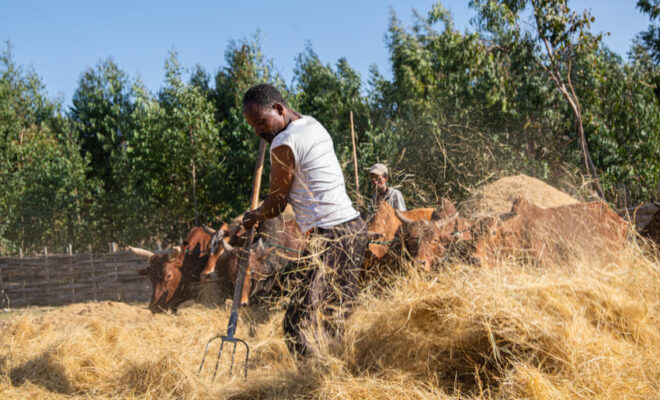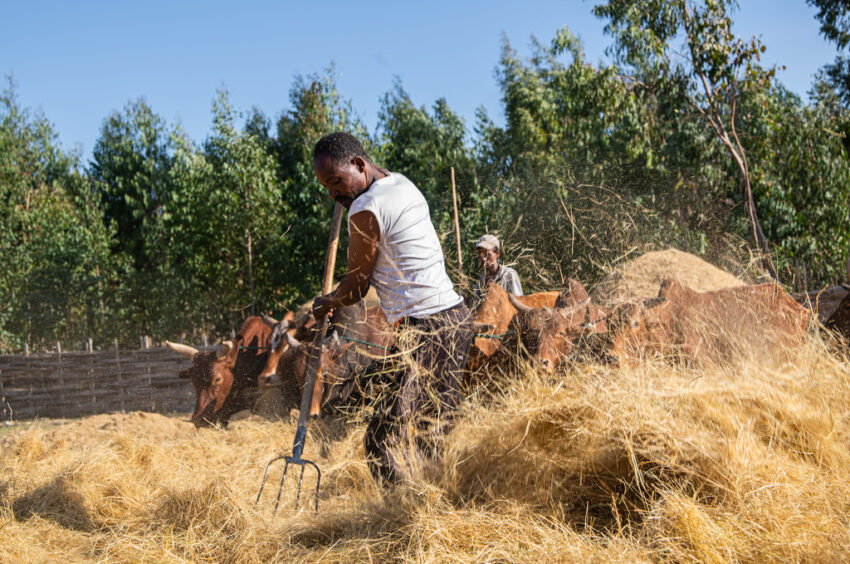“Genetic havoc”: Five reasons to be concerned about gene-edited teff

A US research centre has created a new variety of teff, raising unanswered questions over its safety, ownership, and climate implications.

A farmer cultivates teff in Doyogena District, Ethiopia. Credit: ILRI/Georgina Smith.
Last month, the US Department of Agriculture (USDA) concluded that a gene-edited variety of the teff would not be subject to its biotechnology regulation. Scientists behind the new semi-dwarf version of the grain celebrated the decision, which allows them to forge ahead with evaluation. They say their genome-edited teff is significantly shorter than traditional varieties and will reduce “lodging” (whereby the plant breaks or bends), cutting yield losses by up to 25%.
According to the plan, researchers from the Ethiopian Institute of Agricultural Research (EIAR) and regulators from Ethiopia’s Environmental Protection Agency (EPA) will eventually travel to the US, where the Donald Danforth Plant Science Centre (DDPSC) is conducting tests. They will examine the performance of the crop and discuss the transfer of the technology.
Once in Ethiopia, it is unclear if the gene-edited teff would be subject to the Ethiopian Biosafety Proclamation or if it would avoid biosafety regulation as it has in the US. Different countries approach genome editing differently. For instance, while the US applies more lenient oversight to gene-editing, the European Union treats the technology as a subset of genetic modification and subjects it to the same stringent safety obligations.
On the surface, the development of the new teff variety may seem like good news, especially in the Horn of Africa. In Ethiopia and Eritrea, to which teff is native, over 100 million people rely on the tiny grain as their main staple. Teff is woven into the very essence of communities’ identity and cultural heritage, and people cherish its distinct taste, texture, versatility, health advantages, and adaptability across diverse agroecological regions. A quintal of teff fetches a higher price than any other grain, making it an essential source of income for many farmers.
What’s good for teff, one might expect, is good for farmers and consumers in Ethiopia and Eritrea – not to mention in the wider world, where the staple’s gluten-free health benefits are increasingly catching on. A closer look at the gene-editing breakthrough, however, raises many sources of concern.
Here are five unanswered questions that should, in fact, lead us to be deeply troubled by this recent development.
1) Will it be safe?
The scientific community is divided when it comes to the safety and ethics of gene editing. While some see the technology as a route to important breakthroughs, others regard it is highly risky. A systematic review of the debate found a wide range of concerns scientists have with non-human gene editing. These include the limited disciplinary diversity among contributing academics, a lack of systematic comparisons regarding the potential outcomes of using such technologies, an underrepresentation of animal and environmental interests, and a disconnect between public and academic discourse on the subject.
Where gene editing has already been deployed, it has often had worrying unexpected effects. Scientists investigating the use of these new techniques have warned of “genetic havoc” as they’ve discovered unintended damage to DNA and found genetically-edited cells to be prone to seeding cancerous tumours. As a report by Friends of the Earth and Logos Environment warns, gene-editing can lead to unexpected molecular-level effects with serious risks to the health of humans, the environment, and whole ecosystems. “As the current research shows, precise edits do not necessarily result in precise outcomes,” write the authors.
This is why the USDA decision not to apply biosafety regulations is so concerning. It is unclear if Ethiopia’s EPA will follow the US’ lead, but even if it does subject gene-edited teff to greater scrutiny, the agency lacks capacity. The EPA is one of the country’s most vulnerable institutions, having been degraded from a ministry to an authority and having lost much of its power. Its biosafety control section is short of laboratories and staff, while its levels of expertise have suffered from a brain drain. Would we know of the complex and potentially damaging effects of gene-edited teff on people’s health, the environment, genetic diversity, and more before it is too late?
2) What will happen to local varieties and knowledge?
The Ethiopian Biodiversity Institute, Africa’s largest and oldest seed bank, holds 6,000 different varieties (“accessions”) of teff. These have survived and adapted, some over millennia, to suit different agroecological landscapes. As the climate changes, famers in Ethiopia have increasingly been turning to these traditional varieties that are proving resilient and adaptable. By contrast, growers are finding that new varieties, promoted by the government and research centres in the name of increasing productivity, are failing to withstand the changing climate.
What will happen to these traditional crops as they mix with aggressive gene-edited varieties? Any Ethiopian plant breeder will tell you that new varieties created by research centres inevitably end up undermining local types and farmers’ knowledge. Ethiopia is already rapidly losing crop diversity to growing monocultures – the exact opposite of what is needed during the climate crisis to build resilience, reduce emissions, and restore ecosystems.
3) Will it usher in more intensive chemical usage?
Gene-edited plants are typically designed to be, among other things, resistant to synthetic herbicides. This suggests that they are intended to be used in a Green Revolution-style chemically intensive approach to agriculture. This model has been shown to be detrimental to the environment, people’s health, and local livelihoods and culture. The heavy use of synthetic fertilisers and pesticides has additionally been shown to contribute significantly to the climate crisis.
How is the gene-edited teff variety intended to be cultivated? Will it be accompanied by the ramping up of agrochemical usage?
4) Will tests in the US be applicable to Ethiopia?
Ethiopia is highly ecologically diverse as seen in its wide variety of soil and vegetation, which require much more research. Conditions in the US, where the gene-edited teff is being evaluated, are distinct. Will results of tests in the US be applicable to Ethiopia?
At the 2014 conference to validate the Biotechnology and Biosafety Policy Implementation Plan for the Common Market for Eastern and Southern Africa (COMESA), which comprises 21 countries, the then-Head of the Ethiopian Biotechnology Research Institute stated: “I believe testing of GMO crops is done in the United States under the auspices of the United States Department of Agriculture (USDA). As a result, there is no need for us to do risk assessments in Africa. We should obtain the seeds and plant them.”
I will not be surprised if Ethiopian regulators going to the US to examine the gene-edited teff take the same attitude and approve the seeds without further research.
5) Who stands to gain?
It’s as yet unclear who will own the gene-edited teff variety, and it would be naïve to assume it won’t be patented. Research institutes in the US are unlikely to invest heavily in research and regulatory approval without the prospect of recouping the costs and profiting from the initiative. This raises further questions of who will be allowed to use the teff variety and under what conditions.
Multinational agribusiness conglomerates – with links to universities and research centres across the US – have altered how billions of people produce, distribute, and consume food. Agrochemical and seed companies are always looking to fortify their oligopoly power with the rollout of novel, proprietary genetic technologies including gene-editing and RNA-based pesticide spray. In India, where companies that produce patented hybrid seeds have come to dominate the seed sector, farmers’ independence and livelihoods have been undermined, monocultures have accelerated, and genetic diversity has plummeted. Patented teff risks leading to similar outcomes in Ethiopia.
The wrong answer
While the quest for gene-edited crops may seem benign, it cannot be separated from its context. Gene-editing and genetic modification are part of a system that imagines a food system made up of automated monocropping farms, highly processed biotech crops, corporate control, and enormous profits. It pursues this agenda despite extensive risks posed by gene-editing, not just to the environment and health but to farmers’ livelihoods, justice, and sovereignty.
The alternative to this vision lies in agroecology. This approach nourishes the soil and environment by working with natural processes rather than against them. It puts power in the hands of farmers, improving livelihoods, local economies, and the right to food. And it is highly adaptive to the climate crisis, enhancing biodiversity and capturing carbon rather than degrading the soil and emitting huge quantities of greenhouse gases.







Excellent piece and very informative. Thank you Million.
Wondwossen
Thank you, Dr. Million Belay, for sharing your concerns about the prospects/possibility of introducing gene-edited teff to Ethiopia. I worked with smallholders (farmers) as an agronomist and extension worket in Ethiopia, South Sudan, Kenya, Uganda over the last fourty years. What I learned from these farmers, especially in ETH. and S. Sudan is that they preferred “stability of yield over time” rather than “higher yields from exotic or improved varieties” which must be grown with inputs including chemical fertilizers and pesticides. Introducing genes-edited varieties of teff would be a disaster for smallholders given the issues raised in this article. I will share this articles with colleagues and friends to raise our concerns to the relevant Ethiopian authorities and other stakeholdets before its introduction.
Such a serious topic. I am deeply concerned about genetic modification and corporate greed which go hand-in-hand with this article. Just look at the COVID vaccines and the health risks associated with it. You start playing
around with the chemistry of food products and it will eventually alter the chemistry of humans with detrimental results. Again, some of the COVID vaccines have proven this to be true.
Appreciate Million for bringing what is going behind the doors that can potentially destroy 100s of millions across East Africa. I hope the Government of Ethiopia do in favor of its large and small scale farmers and society which deserves the good for its livelihood. Alarming as it is, this has to be on local newsletters, broadcasting companies and magazines written or spoken in local languages. The people deserve the truth!
It seems more is still coming and the local teff stands a risk of loss. According to Donald MacKenzie, executive director of IICI, the decision to clear teff gene editing to reduce lodging in Ethiopia is an important precedent for further editing to tackle pod shattering, small grain size, weed control, and climate Let’s watch the space.
Our Tef is everywhere in the world by one or another way going out of the country for different purposes such as “research” and “export commodity” in few. Hence, I can say different countries are currently consuming tef. Hence, the consequence of gene edition must be underlined in focus of human health, risk and loss of genetic diversity. The crop is a staple food of the Ethiopians. We need to be aware of the impact of this new technology in the next generation population. Farmers are mostly targeted to stable yield as mentioned by DIRESS MENGISTU above. In addition, the farmers are interested on the taste of their local varieties. Therefore, it is important to screen and identify potential candidate lines of the farmer’s varieties with the participation of the farmers and develop new cultivars without gene edition through conventional breeding technology (without gene addition, deletion, insertion, etc).
“At the 2014 conference to validate the Biotechnology and Biosafety Policy Implementation Plan for the Common Market for Eastern and Southern Africa (COMESA), which comprises 21 countries, the then-Head of the Ethiopian Biotechnology Research Institute stated: “I believe testing of GMO crops is done in the United States under the auspices of the United States Department of Agriculture (USDA). As a result, there is no need for us to do risk assessments in Africa. We should obtain the seeds and plant them.””
I am more than curious who said this?
To me GMO’s are not welcomed the world dose have awareness on matter released to it. We Ethiopians have wide rang teff diversity yet to be tested . I don’t go deep in to the scientific issues the concerned breeders & agnatic engineer’s can say more .
Solomon Eshete
Organic agriculture expert .
Thank you for the post.unfortunately your concerns appear to be justified.Colonialism has many methods hasn’t it I hope you are able to achieve the outcome for all Ethiopians
Go ahead with your wasted debate as usual (fake business). Science remains science.